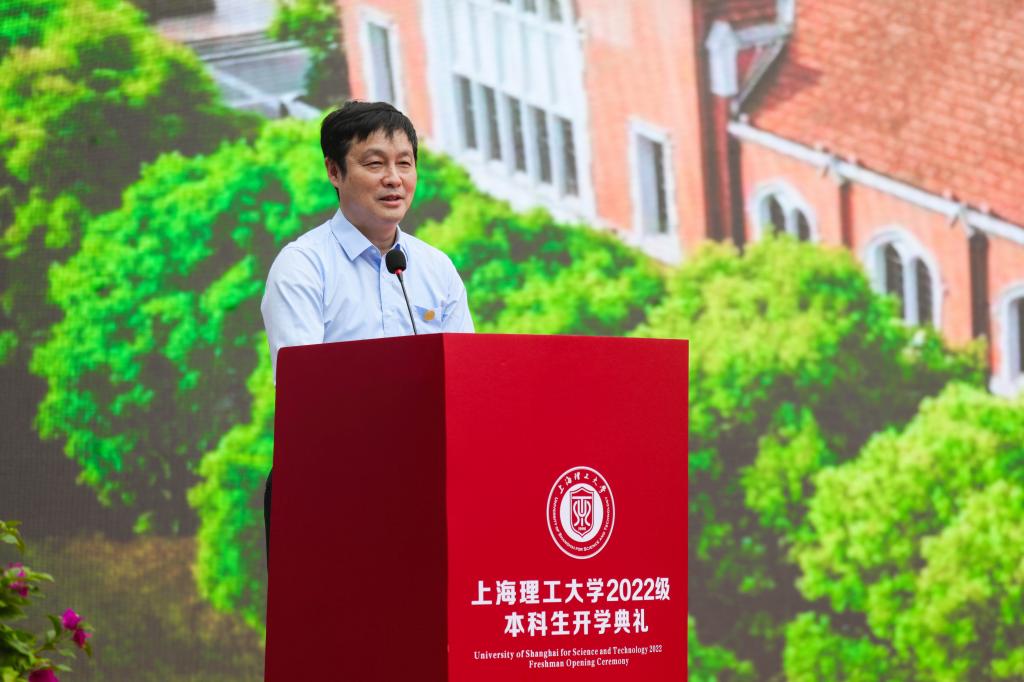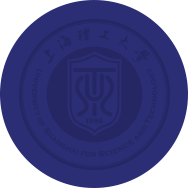
President Ding Xiaodong's speech at the opening ceremony for new USS-Ters
Good morning, dear colleagues, and dear new USST-ers!
This golden September, the beautiful campus of USST has welcomed in more than 4,000 “fresh newcomers”, who have overcome the test of the epidemic and entered college after years of hard work. First of all, on behalf of the university, I would like to extend a warm welcome and heartfelt congratulations to all the new students. Meanwhile, I would also like to express my heartfelt thanks to the 74 demobilized college students who have undertaken the task of freshmen military training. Thank you for your hard work!
In the past three years, you have encountered unprecedented challenges in your studies at a critical stage of your life due to the novel coronavirus epidemic, not only giving up a substantial part of your time at school, but also experiencing the “Great Shift” from offline to online, so you have a more unique experience of how to adapt to the new form of learning under the ever-changing external environments. I have always emphasized that “students should give priority to their studies.” Today, as you have pushed open the door of higher education, your major task of “learning,” which you have been familiar with for so many years, may become “a totally strange thing” familiar to you. For example, does study mean listening to the teachers in class? Does a high grade mean that you are good at studying? Does the completion of all your courses mean that you can solve all your real-life problems? ...Therefore, I will try to show you the exclusive “way” of university study today, and answer the three core questions of "Why should we study?", "What should we study?" and "How should we study?" in university.
I.Bear in Mind What Is of Vital Importance for the Country, and study for the great rejuvenation of the Chinese nation
One day in 1915, a group of Chinese overseas students gathered at Waseda University in Japan. Pressed by Li Dazhao, Chen Duxiu expressed his point of view on the situation of the motherland, causing a conflict. This is a scene in the first episode of the TV series "The Awakening Age". Perhaps many of you did not realize that this scene was shot at the Hujiang International Cultural Park in USST. More than a hundred years ago, with the ambition to serve the country, enlighten the people with their knowledge, spread their ideas, and seek a way out for the nation, the progressive young people such as Li Dazhao and Chen Duxiu founded the Communist Party of China and revitalized the revolution.
Today, we are in the era of peace, which has been won by our countless forefathers with their blood and tears, and we are about to welcome the 20th National Congress of the Communist Party of China. We have just solemnly welcomed the return of the remains and souls of the ninth group of 88 martyrs in South Korea back to their homeland. The return of our heroic martyrs is both a consolation for them and a legacy for us. When you leave your hometown and come to the university of your own choice, when you welcome in your new period of life with this solemn ceremony, you should feel happy in the ordinary quiet years. As Wei Wei wrote in “Who is the most Lovable Person?", “Please realize that this is a kind of happiness, because only when you realize this can you understand the root cause why our fighters were willing to risk losing their lives to fight in Korea more deeply."
No matter how far we may go, we must not bear in mind our mission and our goal. The Party has proposed that by 2035 China will basically realize socialist modernization and build up a great modern socialist country by the middle of this century. In the journey to achieve this great goal, you are precisely the new youth of the New Era, and you are the successors and pillars of the great responsibility. Now, you are here in college to absorb nutrients and accumulate strength, not only to temper the mature body and mind, meet a better self-made yourself, but also to inherit the wishes of martyrs, follow the footprints of our forefathers, harbor “what is of vital importance for the country", and integrate your own development into the flood of national rejuvenation, study for the prosperity of the country and the happiness of the people.
II. A magnificent transformation of learning style ahead
I would like to share with you a story about Franklin W. Olin College of Engineering in the United States. When Olin College of Engineering was founded, there were delays in the construction of the campus and the curriculum was not yet established, so it was impossible for the 30 students who had been enrolled to attend classes, and the college had to put them in temporarily converted classrooms. These students had just graduated from high school and had never taken any college courses just like you. However, they were told to make a pulse oximeter within 5 weeks, something the students had never heard of and the school only provided some background information, some tools, parts and elders to consult. The teachers thought it was an impossible task. After all, the transistor module in the pulse oximeter was the cutting-edged research result of semiconductor physics at that time. However, incredibly, the students did make a working pulse oximeter indeed. The students who had no knowledge at all about calculus and physics did make a state-of-the- art-machine! Doesn’t this overturn your understanding of “learning” in life?
In my opinion, students should keep pace with the university and achieve three changes: First, the change from arranged learning to autonomous learning. The university has transferred the things that were once arranged by teachers and parents to you yourself, and it is up to you to set your own learning goals, make your own learning plans, and carry out your own learning tasks. Secondly, the change from one-way learning in which the teacher lectures and the student listens to Hands-on Inquiry-Based Learning. Learning in college does not necessarily happen in the traditional class or classroom. Choosing a problem as a breakthrough point for investigation is an important way of learning advocated by the university. Third, the change from seeks knowledge to updating your competitive competence. In this era when knowledge is readily available, university learning focuses more on the transfer and application of knowledge and the independent construction of a knowledge map. Learning emphasizes not merely the result of knowledge learning, but the process of it. In short, college learning is about learning flexible, adaptable, and integrated methods, ideas, and abilities.
III. Master the exclusive key to university learning
For the methodology of "how to learn" in university, I have three more suggestions.
One is to learn in problem solving. The boundary of university education has broken through the campus and extended into society. If you want to engage in creation, matching the new trends and new needs of social development in the future, you should start from the university to "solve real problems" in the relevant real fields.
Xu Yan, a student from the School of Materials and Chemistry of our university, focused on solving the problem of "white pollution". Through a lot of market research, literature collection and repeated experiments, she developed new straws made of nut shell fiber to replace paper straws, winning her the first prize in the China National College Students’ "Innovation, Originality and Entrepreneurship" Challenge. Such problem-solving learning opportunities are emerging in one after another at USST. In the past three years, on average, our university has offered almost 1,200 research project courses and college students' innovation and entrepreneurship competition projects each year, with 18,000 students participating in them, and nearly 3,600 projects winning provincial-level awards or above each year on average, of which more than 540 projects have won national-level awards. USST is also the first local university in Shanghai to win the Gold Award in the China College Students’ “Internet+” Innovation and Entrepreneurship Competition.
The second is to learn in communication. Confucius once said, “Of three people walking together, there must be one good enough to be my teacher, for people grow up through communication, negotiation and cooperation in social interactions. Studying in a university of science and technology, you must give up the established practice of “keeping a low profile and doing things in a quiet way". Instead, you should attach importance to oral and written communication, interdisciplinary communication and cross-cultural communication to improve your ability in communication, teamwork, conflict solution, self-promotion, organization and management, as well as your ability to perceive and appreciate beauty. At USST, you can get on the stage of the roadshow of both “mass entrepreneurship” and “innovation projects”, for example, showing your original ideas and achievements confidently, constructing rational thinking in the deliberation of writing plans, projects and academic papers, and having a brainstorm in groups in intelligent classrooms and learning and thinking spaces. You will find that the learning experience of dialogues, display and collision brings about the sublimation of ideas and cognition.
The third is to learn in cross-disciplines. Solving complex system problems cannot be based on single-dimensional knowledge alone, but relies on the synthesis and integration of multidisciplinary knowledge. The disciplinary features of USST lie in that it is, on the one hand, dominated by engineering, which intersects with other disciplines, like the combination between engineering and medicine. The surgical suture needle developed by us can help doctors suture the skin with ease, the surgical high-frequency electric knife created with innovative materials can prevent tissue adhesion, and the mixed reality surgical navigation system can provide precise positioning and navigation of blood vessels for surgeons...On the other hand, the disciplines of economics, management, humanities, law and art are marked with the brand of "engineering". For example, Sci-tech German is the combination of the German language learning with science and technology; industrial design combines art with engineering; management focuses on strategic and managerial issues related to manufacturing; and so on. The distinctive features of the university's disciplines determine that your university studies should break the boundaries of your major and move towards "a grand synthesis", which not only allows you to broaden your vision and thinking through diversified disciplinary backgrounds and thinking modes, but also promotes you to come up with ideas and unconventional problem-solving methods that go beyond the traditional disciplinary framework, and forges a core competence unique only to you.
British philosopher Whitehead once said, “The ideal of a university is not so much knowledge as power; the goal of a university is to transform the knowledge of a child into the power of an adult.” All things are lovely and life is bright. The only thing is that we must live up to youth and dreams. It is hoped that you will cherish your college time which bears your youth and dreams, that you will combines the needs of the nation, the mission of the times, and the ideals of your life here, and that you will accumulate the "strength of a grown-up", locate the most suitable field for your own studies, and walk out to an even bigger world from USST! Thank you all!

 Home
·
News & Events
·
Content
Home
·
News & Events
·
Content

